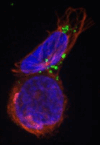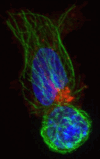Familial hemophagocytic lymphohistiocytosis: a model for understanding the human machinery of cellular cytotoxicity
- PMID: 21990010
- PMCID: PMC11114696
- DOI: 10.1007/s00018-011-0835-y
Familial hemophagocytic lymphohistiocytosis: a model for understanding the human machinery of cellular cytotoxicity
Abstract
Cytotoxic T lymphocytes, natural killer cells, and NKT cells are effector cells able to kill infected cells. In some inherited human disorders, a defect in selected proteins involved in the cellular cytotoxicity mechanism results in specific clinical syndromes, grouped under the name of familial hemophagocytic lymphohistiocytosis. Recent advances in genetic studies of these patients has allowed the identification of different genetic subsets. Additional genetic immune deficiencies may also induce a similar clinical picture. International cooperation and prospective trials resulted in refining the diagnostic and therapeutic approach to these rare diseases with improved outcome but also with improved knowledge of the mechanisms underlying granule-mediated cellular cytotoxicity in humans.
Figures



References
-
- Moretta A, Marcenaro E, Parolini S, et al. NK cells at the interface between innate and adaptive immunity. Cell Death Differ. 2008;15:226–233. - PubMed
-
- Moretta L, Ferlazzo G, Bottino C, et al. Effector and regulatory events during natural killer dendritic cell interactions. Immunol Rev. 2006;214:219–228. - PubMed
-
- Ruggeri L, Capanni M, Urbani E, et al. Effectiveness of donor natural killer cell alloreactivity in mismatched hematopoietic transplants. Science. 2002;295:2097–2100. - PubMed
-
- Moretta L, Locatelli F, Pende D, et al. Killer Ig-like receptor-mediated control of natural killer cell alloreactivity in haploidentical hematopoietic stem cell transplantation. Blood. 2011;117:764–771. - PubMed
Publication types
MeSH terms
Substances
Supplementary concepts
LinkOut - more resources
Full Text Sources

